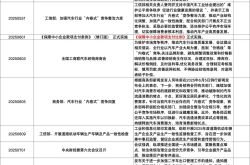After the Surge of Foreigners, Xiaohongshu Finds New Cards to Play
![]() 01/16 2025
01/16 2025
![]() 632
632
"Hello World" is unexpectedly becoming a reality on Xiaohongshu.
As TikTok prepares to exit the US market, a substantial number of creators and everyday users are seeking a new home. Xiaohongshu, chosen as the new haven by these "cyber refugees," has garnered unprecedented public attention since its inception.
This group of overseas users dub themselves "TikTok Refugees," comprising some of the most active users on TikTok in the US, including numerous KOLs with vast followings. If you happen to encounter a blogger showcasing talents or posting meme videos on Xiaohongshu right now, they might be prominent TikTok users with millions of followers. Their enthusiastic promotion is drawing global attention to this Chinese app that facilitates global information exchange without regional restrictions and treats domestic and foreign IPs equally.
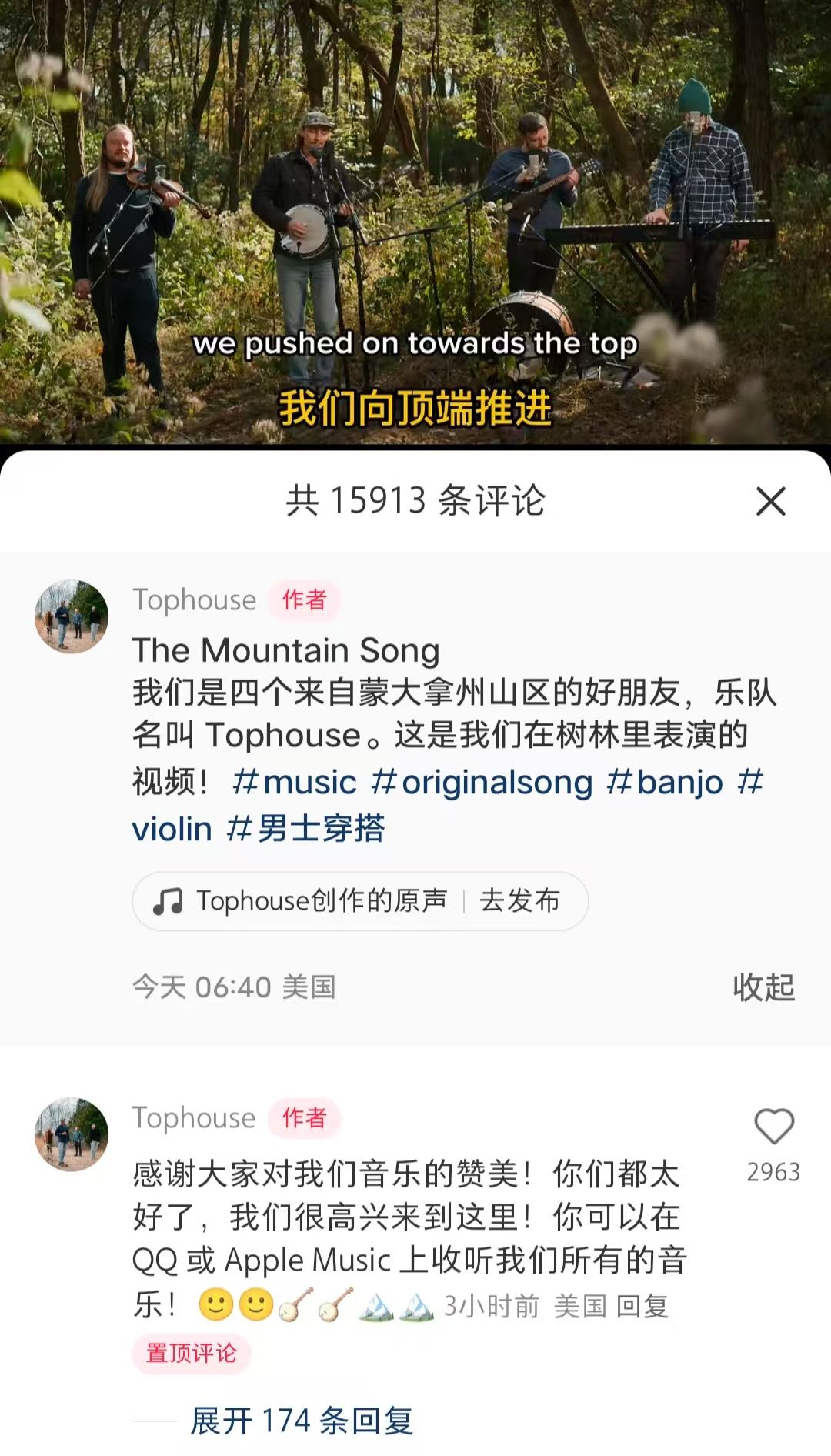
Xiaohongshu has successfully attracted a surge of traffic in a short period. Despite numerous controversies and concerns, Caijing Magazine reports that Xiaohongshu already has a plan in motion: "Xiaohongshu will take some actions next, but it is not convenient to disclose them yet." Following the "influx of foreigners" incident on January 13, Xiaohongshu announced "Nine Measures for Algorithm Fairness and Kindness" on January 14. Additionally, some commercial service providers and institutions have begun to capitalize on this sudden opportunity.
As of press time, topics such as "American netizens flock to Xiaohongshu to pay cat tax," "Xiaohongshu recruits English content reviewers overnight," and "Foreign netizens switch to foreign teachers on Xiaohongshu in seconds" are still trending on major platforms, fully capturing external attention.
For Xiaohongshu, navigating the future direction of this public event is challenging and requires communication and coordination from multiple parties. Based on historical experience, this influx of overseas users seems unlikely to fundamentally alter Xiaohongshu's development model. In 2013, when Yahoo was about to acquire the overseas light podcaster Tumblr, many users flocked to LOFTER, a similar product developed by China's NetEase, fearing that Tumblr would decline post-acquisition. This incident was described as a "postmodern fantastic encounter." However, due to language barriers, cultural style differences, and LOFTER's product operations, integration ultimately did not occur, and LOFTER has long since transformed.
On Xiaohongshu, some Chinese users complain that too many English content push notifications disrupt their information flow, while others urge Xiaohongshu to quickly add internationalization features such as real-time translation. Meanwhile, while many overseas users gain recognition through behaviors like "paying cat tax," some also bring TikTok's logic to Xiaohongshu, frequently leaving comments seeking attention. More content creators have begun directly posting works featuring their personal IP characteristics. Besides English team-building in the comment section, there are also numerous Chinese users wondering about the latency, asking "Why is this recommended to me?" and "Let's speak Chinese."
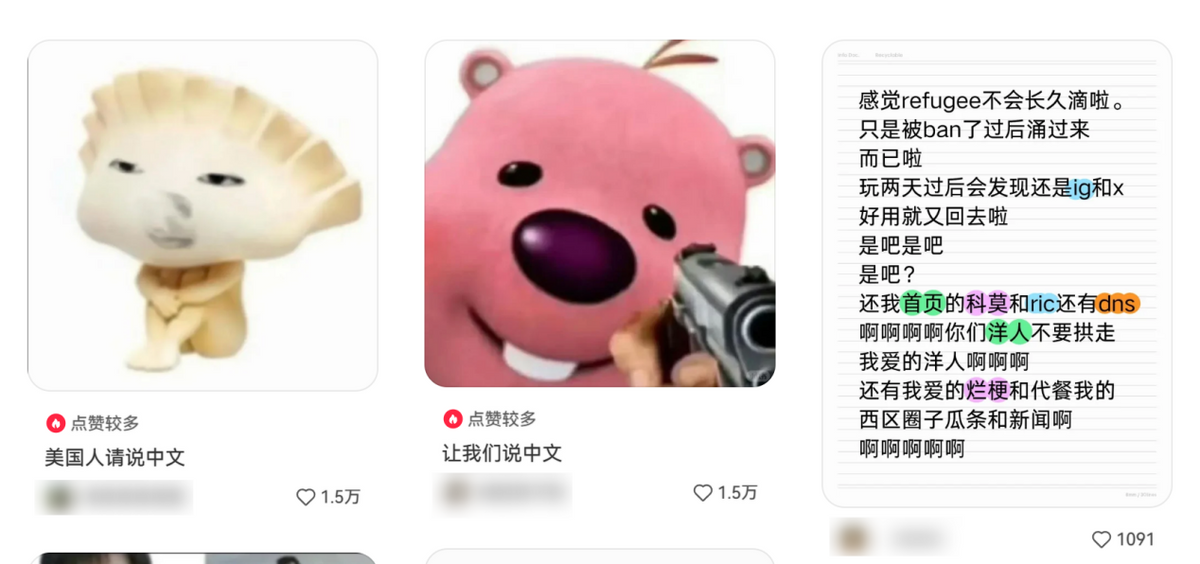
The algorithm is adapting to the sudden exchange of two languages and cultures. Since these conflicts are driven by different cultural backgrounds and social needs, many users remain confused about communication boundaries or seek resonance in abstract and quirky behaviors. Users' actions of seeking common ground while reserving differences are still progressing.
Interestingly, from recent product innovations to sudden traffic spikes, Xiaohongshu has fully demonstrated that a high-quality social media image, valuable users and content, and appropriate product forms and governance principles are currently the internet's most valuable assets. Therefore, even though the TikTok Refugees arrived swiftly and unexpectedly, the outside world praises Xiaohongshu more than it criticizes it, and confidence outweighs concerns.
Sudden Internationalization: Lemon8 Struggles, Xiaohongshu Reaches the Top
When discussing Xiaohongshu's internationalization potential, users jokingly refer to this community, founded by "Stanford students" and originally intended to be the "number one platform for overseas shopping," as already very internationalized.
Xiaohongshu's founder and CEO, Mao Wenchao, graduated from Shanghai Jiao Tong University and worked at Bain Consulting. In 2011, he received an MBA offer from Stanford University. The other founder, Qu Fang, graduated from Beijing Foreign Studies University and worked at Bertelsmann for six years. On May 30, 2017, Xiaohongshu made the front page of People's Daily with an article titled "Xiaohongshu, Sharing a Good Life with the World."
However, times have changed, and the characteristics that attract users to Xiaohongshu have become extremely complex. In terms of internationalization, although Xiaohongshu initially gathered a large number of international students and overseas Chinese, it is not a truly global platform.
As of now, the international version name "xiaohongshu" set by Xiaohongshu has not been unified. Although this name appeared in an advertisement during the Paris Olympics period inviting Liu Xiang and Kylian Mbappe to create together, the software is currently displayed as "xiaohongshu" in some regions of the App Store, while it is displayed as "REDnote" on Google Play and in other regions.
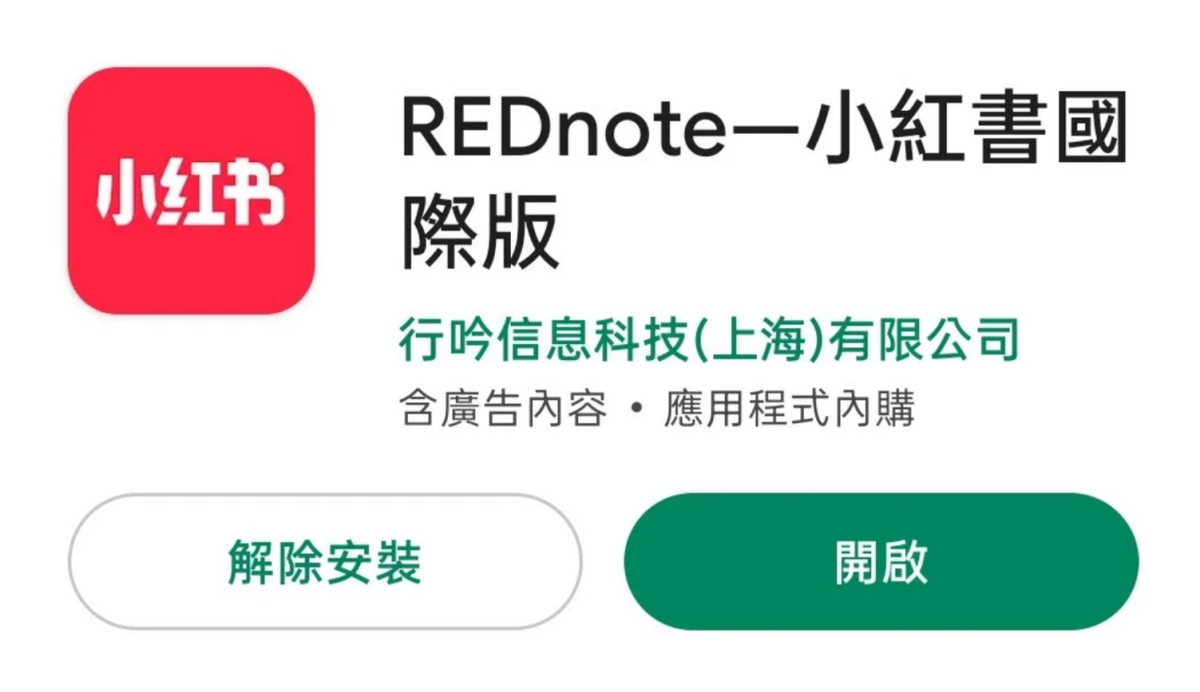
Xiaohongshu's lack of extensive internationalization initiatives does not diminish overseas users' enthusiasm for exploring new bases. Due to registration restrictions, diverse content styles, and a short video mode similar to TikTok, it has become the platform of choice for users leaving TikTok. This group often dislikes the positions and advocacy of Zuckerberg and Musk and refuses to use platforms like Instagram.
Sevenmai data shows that since TikTok influencers advocated for users to go to Xiaohongshu on January 12, Xiaohongshu has topped the charts in over 70 countries and regions worldwide, including Italy, Poland, Germany, and other regions with different languages. This is primarily due to the strong influence of prominent TikTok creators in the US, which radiates to users globally.
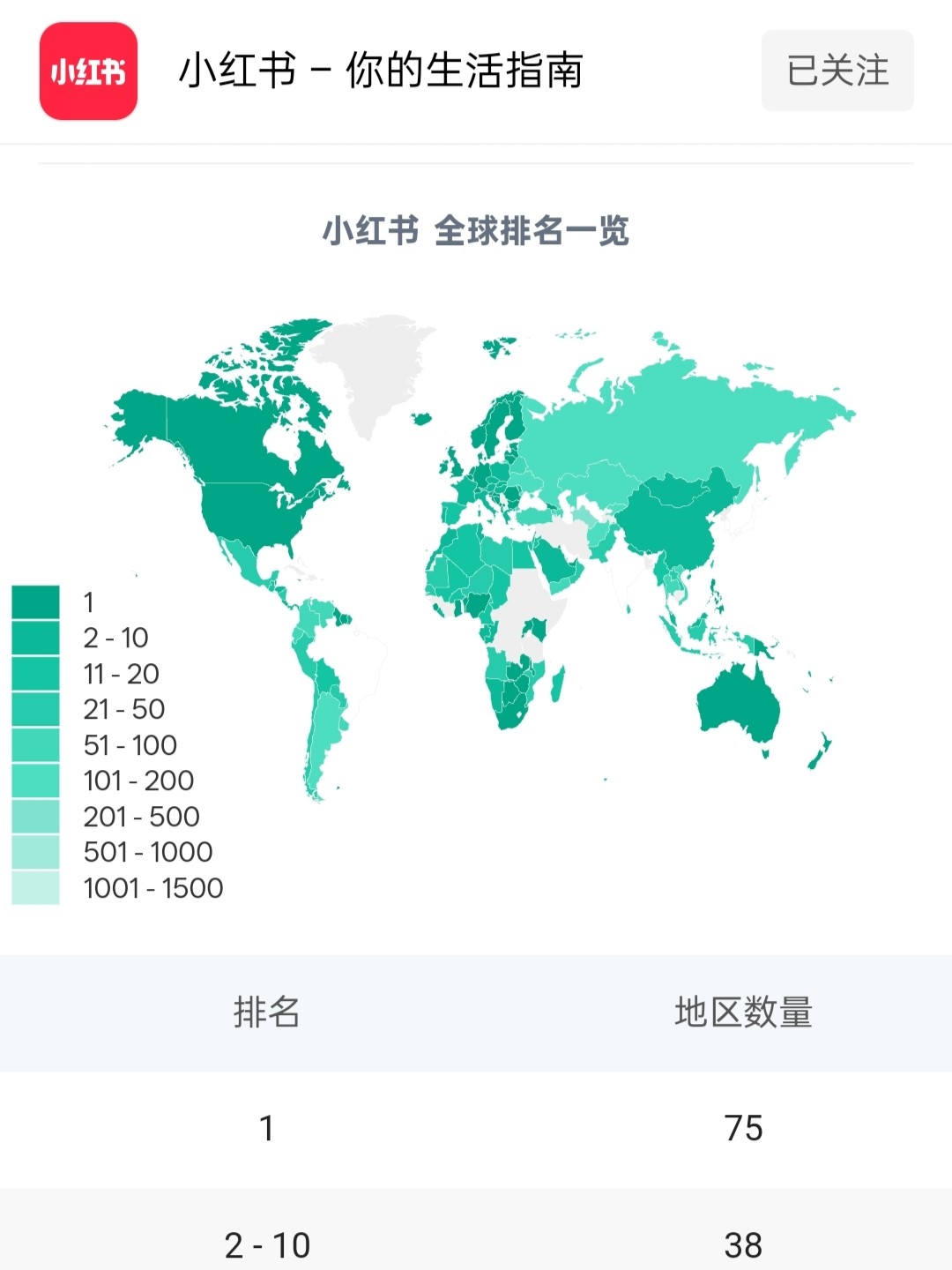
Previously, TikTok attempted to guide users to Lemon8, a platform similar to Xiaohongshu developed by itself. Lemon8 is similar to Xiaohongshu in UI and content orientation and can directly sync TikTok accounts, information, and followers for seamless migration. In the US region of the App Store, Xiaohongshu continues to rank first in downloads, with Lemon8 once following closely behind. However, in users' eyes, since Lemon8 and TikTok come from the same source, they may encounter similar issues, making it not the best choice for migration.
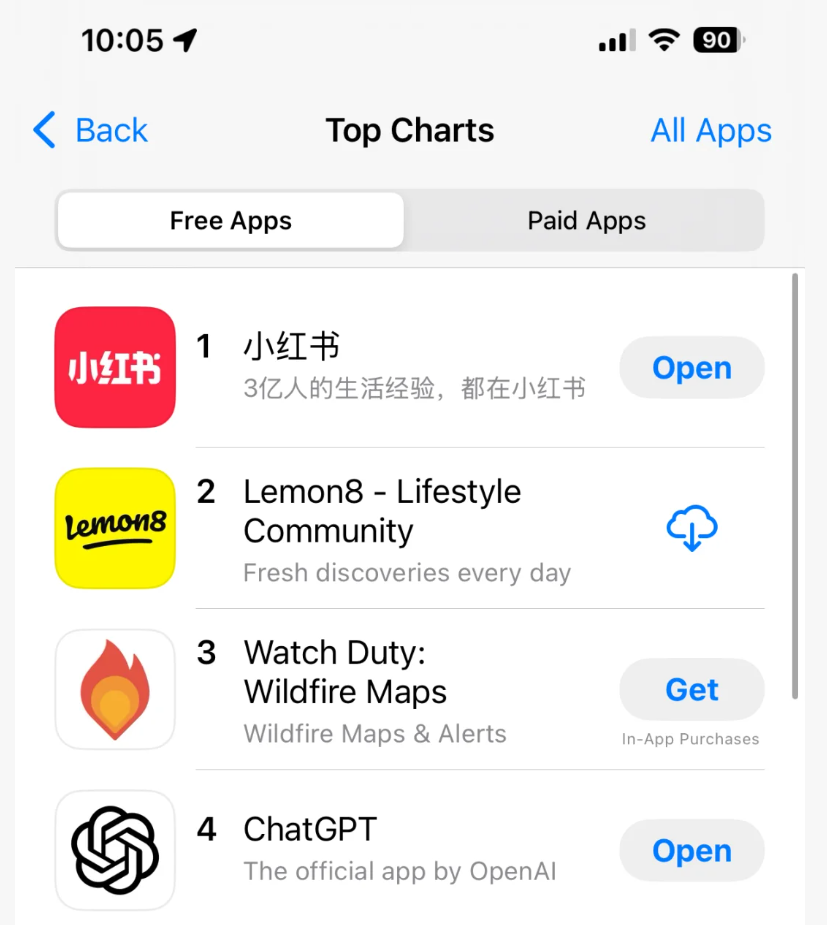
This has further spotlighted Xiaohongshu. While creators actively recruit fans, many local users are also beginning to consider how to leverage this rare international collision for business opportunities. Many users first use language as an entry point to find individuals willing to pay for language learning. Compared to these "small fries," more marketing professionals are contemplating how to capitalize on short-term emotions.
There is a consensus in the industry that this fervent influx of new users in a short period is difficult to retain as long-term users due to language barriers, cultural differences, and conflicting public opinions. Especially since many of them are creators seeking potential TikTok alternatives, they come to Xiaohongshu merely to maintain attention in preparation for monetization.
However, the essence of fervor is the concentrated and intense release of emotions. Effective event marketing during this period is bound to achieve strong exposure. For fields with overseas expansion needs, such as e-commerce or software, this may be an opportunity.
Currently, both sides have users entering the market in vertical product marketing, tourism, role-playing account creation, etc. Overall, although they have different understandings of social logic, they all follow the rule of content-driven. Some developers have also quickly launched translation plugins and content copy plugins to capture user traffic. On January 14 and 15, Xiaohongshu-related stocks such as Remote Technology, One Network and One Creation, and Tianxiaxiu, which are involved in businesses like overseas expansion and e-commerce, rose continuously against the trend.
Peak of Chinese Community Products: Ecology Shaped by User Sharing
In June 2014, Xiaohongshu determined the development route of "emphasizing content and de-emphasizing influencers" and has maintained its dominance in community development ever since. On the Xiaohongshu platform, although the number of followers of KOLs can accumulate considerably, they play a more significant role in private domain development and do not become a key influencing factor of content push like short video platforms.
Similarly, Xiaohongshu recommends a large number of low-follower and amateur bloggers, as well as content that has not yet gained high popularity, rather than a short video recommendation stream where every brush results in "thousand likes" or "ten thousand likes."
Xiaohongshu's model fosters amateur development, and the connection between popularity and interaction behaviors like comments is closer, naturally facilitating topic fermentation and user opinion expression. In Xiaohongshu's double-column information flow mode, users need to go through the process of active screening, viewing, and interaction to extract information they are interested in, with a stronger purpose and a distinct community form. In contrast, short videos forcibly insert information into users' attention, releasing content influence the fastest, and tending towards a media-oriented positioning.
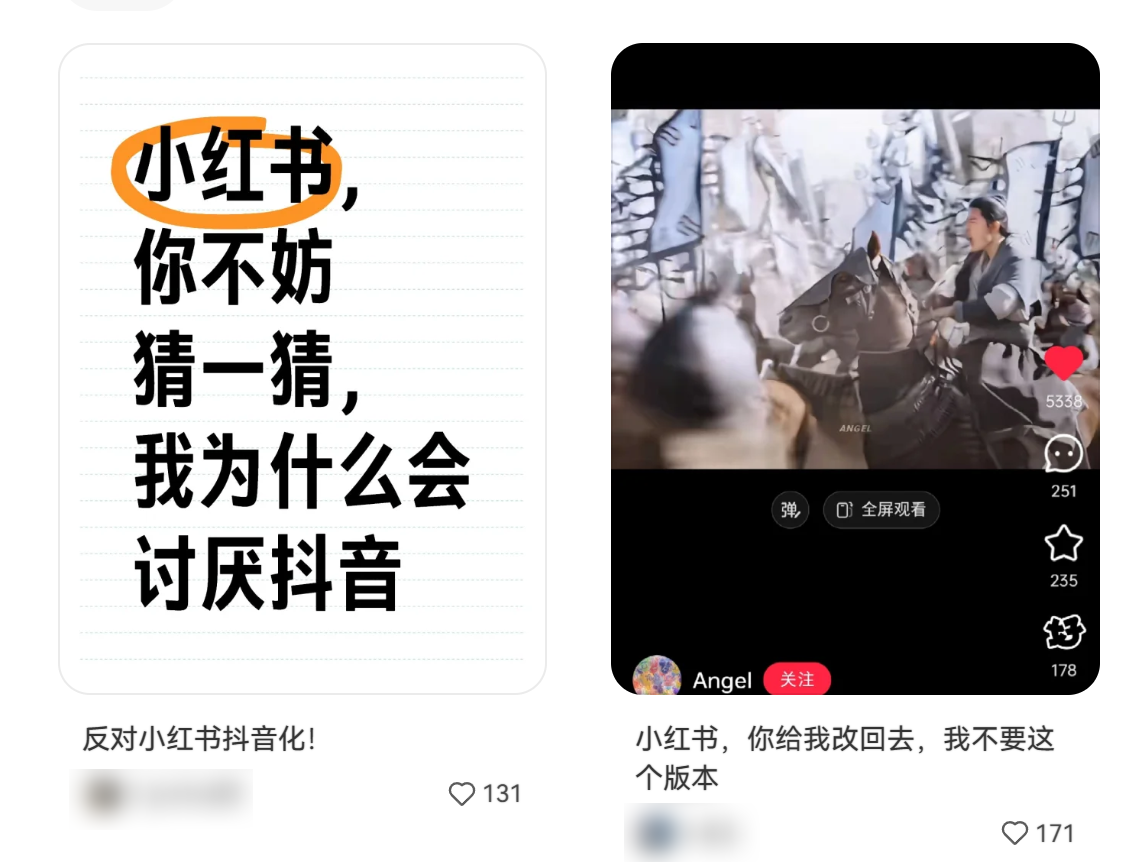
Therefore, with the cooperation of the recommendation algorithm and the logic of image and text, along with short video content distribution, Xiaohongshu has strong information mining capabilities but slightly weaker information dissemination capabilities compared to short video platforms. Both sides have also formed a distinction in user preferences. Because of this, Xiaohongshu has accumulated a vast amount of multi-level sharing content, covering more vertical fields and even niche information, which significantly influences user decision-making. This also positioned Xiaohongshu as a seeding platform.
But essentially, Xiaohongshu's content characteristics and community attributes still determine everything. In this "TikTok Refugees" incident, Xiaohongshu has also quickly formed different user group clustering phenomena.
Its unique ecosystem has made Xiaohongshu's ecological construction path slower but has preserved the platform's uniqueness. Some users have pointed out that platforms with similar value to users were once Baidu Post Bar and later Zhihu, but they ultimately deviated from their course during evolution, and only Xiaohongshu has stuck to its original intention.
This accumulation of content and users brings another commercialization possibility.
Last year, Xiaohongshu added the "Search Potato" smart assistant to search results, focusing on summarizing real user experiences. In August of last year, Xiaohongshu's incubated AI search application "Diandian" quietly went live on the App Store, and in late December, it built-in a question-and-answer function to the Xiaohongshu search association list, with recent continuous updates and rapid iterations. Relying on Xiaohongshu's rich user notes and some high-quality content outside the station, Diandian has become a more differentiated search engine for real-life experiences.
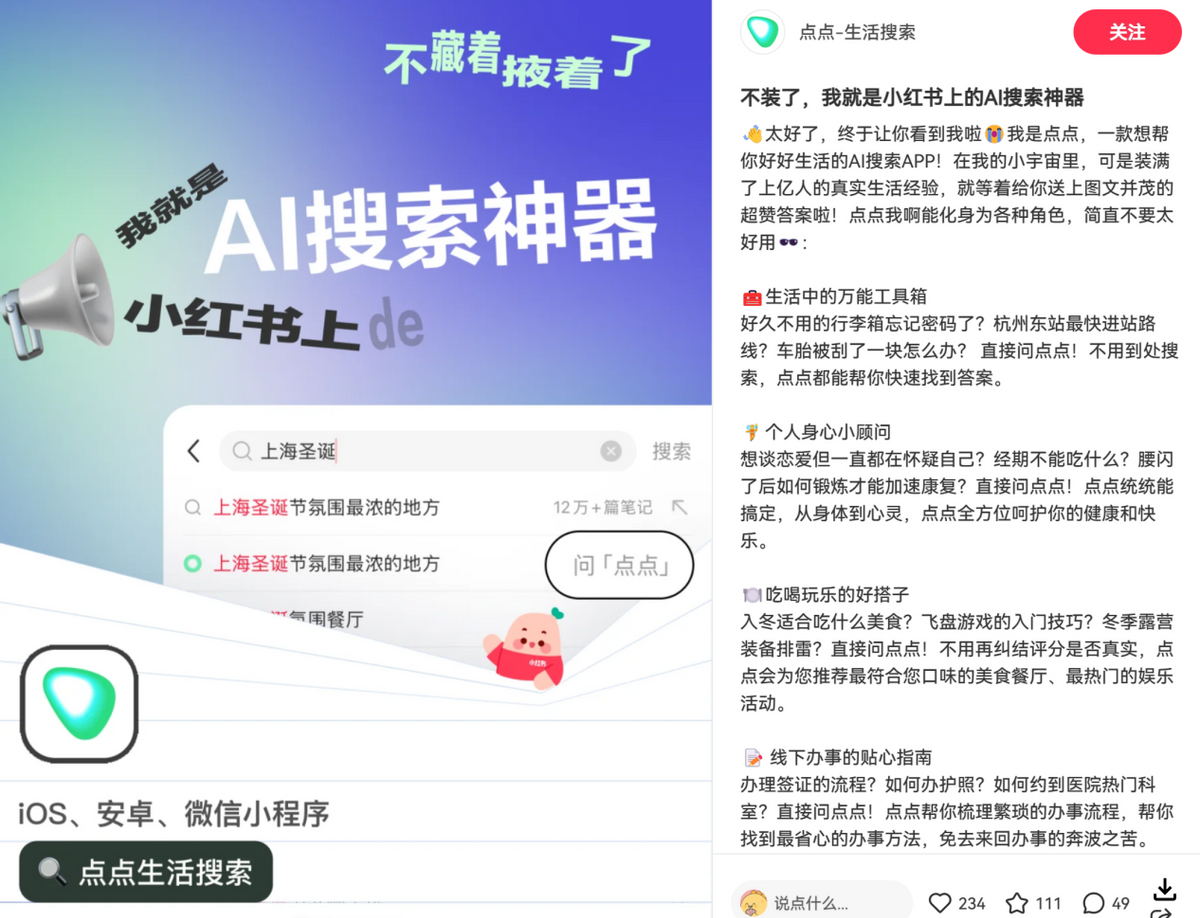
More precisely, searches around Xiaohongshu community content can provide more specific personal insights and precise content for specific small scenarios, rather than worn-out and inaccurate public information.
Official data from Xiaohongshu shows that 70% of monthly active users engaged in search behavior in 2024, with 88% of search behavior initiated by users themselves, and one-third of users developing deep search habits.
For users, Xiaohongshu can replace traditional search engines on many issues. Diandian is still a vertical product serving Xiaohongshu users but holds the potential to aim for large-scale search in the future. Where users' attention is, there are opportunities for commercialization.
Even the reason why users dare to quickly switch their thinking to the business channel in the "TikTok Refugees" incident also stems from the characteristics of Xiaohongshu's community products. The low threshold for graphic and text creation and the simplicity of community communication allow overseas users to download and use it immediately, convenient for any user with ideas. And the myriad of experiences accumulated on Xiaohongshu are also willing to become supporting factors for commercial behavior at this moment.
While users are active, Xiaohongshu has more issues to consider. On January 14, Xiaohongshu announced that it would introduce nine measures to further implement fairness and justice in the algorithm, direct traffic upwards and towards goodness, and promote the transparency of platform governance-related rules. This aligns with the main theme of platform governance and also meets Xiaohongshu's long-term development needs: no matter who the users are, it is necessary to maintain a good community environment and ensure user experience.
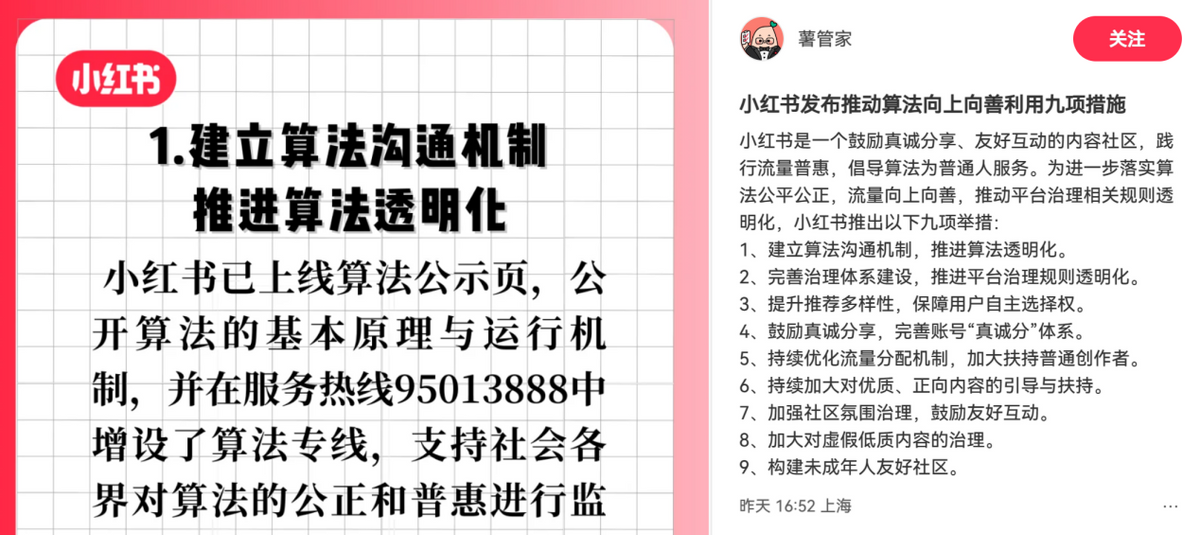
Media reports previously indicated that Xiaohongshu had intensified its offline promotional efforts, even extending to locations like vegetable markets to encourage app downloads. This strategy, however, met with staunch opposition from Xiaohongshu's user base. The core issue lies in the platform's inherent content tone and community environment, alongside the intensity of its algorithmic segregation, which cannot seamlessly integrate the influx of a vast number of lower-tier users. Furthermore, these new users are unlikely to resonate with Xiaohongshu and transition into long-term members. Such short-term user acquisition strategies risk damaging the community's ecosystem and fostering disarray.
From Xiaohongshu's perspective, user diversification might be an inevitable trajectory for community-based products, but the approach must be meticulously crafted. Each influx of users, regardless of their type, enlarges Xiaohongshu's foundational base and enriches the community's diversity. Xiaohongshu's critical task is to ensure that this growth in diversity translates into positive outcomes—both in terms of community ambiance and commercial success.
While the "TikTok Refugees" incident was isolated, it marked a crescendo of changes within Xiaohongshu, where significant shifts occurred abruptly. These alterations significantly boosted Xiaohongshu's popularity and compelled the platform to acknowledge the transformative power of external variables on its community. The initial "joyful reunion" narrative might bring elation, but the subsequent mundane aspects of daily life ("firewood, rice, oil, salt, and sauce") can erode enthusiasm and create rifts.
These challenges may be daunting, but they will undoubtedly hone Xiaohongshu's ability to navigate complex environments. As Xiaohongshu's arsenal grows, its skill in playing its cards is now being rigorously tested.
Source: Pinecone Finance

